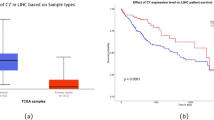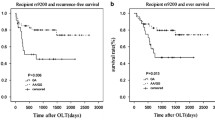Abstract
Background
Methylenetetrahyfrofolate reductase (MTHFR) is the key enzyme for one carbon and folate metabolism. Previous studies have drawn different conclusions about the relationship between the mutation of MTHFR and hepatocellular carcinoma (HCC) occurrence. MTHFR polymorphisms' influence on liver transplantation for HCC recurrence has yet not been reported. Aim of this study was to clarify the impact of MTHFR polymorphism on hepatocarcinogenesis and the prognosis of liver transplant recipient with HCC.
Methods
This study enrolled 244 HCC patients and 487 healthy individuals in Chinese Han population to analyze the influence of MTHFR polymorphism on HCC susceptibility first. Furthermore, this research choose another 100 donors’ and 104 recipients’ specimens to detect the association between polymorphism of MTHFR and post-transplant HCC recurrence.
Result
rs1801131 polymorphism A to C was associated with the occurrence of HCC in Chinese Han population (p < 0.05), especially in age exceeding 50 years (p < 0.01). No association was observed with rs1801133 polymorphism and HCC occurrence. The mean tumor-free survival for recipients with donor liver graft rs1801133 C to T variants was shorter than CC type (12.63 ± 3.84 vs 22.43 ± 4.74 months, p < 0.05). Multivariate analysis revealed that Donor rs1801133 and Hangzhou criteria were two independent prognostic factors for tumor-free survival (p < 0.05). Neither donor rs1801131 polymorphism nor recipients’ MTHFR polymorphisms was associated with HCC recurrence.
Conclusion
This study demonstrated that MTHFR polymorphism was associated with HCC occurrence and post-transplant HCC recurrence. rs1801131 mutation A to C is a valuable molecular biomarker for predicting HCC occurrence in Chinese Han population. Donor MTHFR rs1801133 C to T polymorphism could present as a promising prognostic biomarkers for HCC recurrence in liver transplant recipients.


Similar content being viewed by others
Abbreviations
- LT:
-
Liver transplantation
- HCC:
-
Hepatocellular carcinoma
- MTHFR:
-
Methylenetetrahyfrofolate reductase
- SAM:
-
S-adenosylmethionine
- HBV:
-
Hepatitis B virus
- AFP:
-
Alpha fetoprotein
- SNP:
-
Single nucleotide polymorphism
- OS:
-
Overall survival
- TFS:
-
Tumor-free survival
References
Torre LA, Bray F, Siegel RL, Ferlay J, Lortet-Tieulent J, Jemal A. Global cancer statistics, 2012. CA Cancer J Clin. 2015;65(2):87–108.
Venook AP, Papandreou C, Furuse J, de Guevara LL. The incidence and epidemiology of hepatocellular carcinoma: a global and regional perspective. Oncologist. 2010;15(Suppl 4):5–13.
Zimmerman MA, Ghobrial RM, Tong MJ, Hiatt JR, Cameron AM, Hong J, et al. Recurrence of hepatocellular carcinoma following liver transplantation: a review of preoperative and postoperative prognostic indicators. Archives of surgery. 2008;143(2):182–8 (discussion 8).
Trevisani F, Garuti F, Cucchetti A, Lenzi B, Bernardi M. De novo hepatocellular carcinoma of liver allograft: a neglected issue. Cancer Lett. 2015;357(1):47–54.
Wu LM, Zhang F, Xie HY, Xu X, Chen QX, Yin SY, et al. MMP2 promoter polymorphism (C-1306T) and risk of recurrence in patients with hepatocellular carcinoma after transplantation. Clin Genet. 2008;73(3):273–8.
Wu L, Xu X, Shen J, Xie H, Yu S, Liang T, et al. MDR1 gene polymorphisms and risk of recurrence in patients with hepatocellular carcinoma after liver transplantation. J Surg Oncol. 2007;96(1):62–8.
Yuan JM, Lu SC, Van Den Berg D, Govindarajan S, Zhang ZQ, Mato JM, et al. Genetic polymorphisms in the methylenetetrahydrofolate reductase and thymidylate synthase genes and risk of hepatocellular carcinoma. Hepatology. 2007;46(3):749–58.
Qi YH, Yao LP, Cui GB, Liang J, Shao QJ, Yan LF, et al. Meta-analysis of MTHFR C677T and A1298C gene polymorphisms: association with the risk of hepatocellular carcinoma. Clin Res Hepatol Gastroenterol. 2014;38(2):172–80.
Cui LH, Song Y, Si H, Shen F, Shin MH, Kim HN, et al. Folate metabolism-related gene polymorphisms and susceptibility to primary liver cancer in North China. Med Oncol. 2012;29(3):1837–42.
Fabris C, Toniutto P, Falleti E, Fontanini E, Cussigh A, Bitetto D, et al. MTHFR C677T polymorphism and risk of HCC in patients with liver cirrhosis: role of male gender and alcohol consumption. Alcohol Clin Exp Res. 2009;33(1):102–7.
Kuo CS, Huang CY, Kuo HT, Cheng CP, Chen CH, Lu CL, et al. Interrelationships among genetic C677T polymorphism of 5,10-methylenetetrahydrofolate reductase, biochemical folate status, and lymphocytic p53 oxidative damage in association with tumor malignancy and survivals of patients with hepatocellular carcinoma. Mol Nutr Food Res. 2014;58(2):329–42.
Kwak SY, Kim UK, Ch HJ, Lee HK, Kim HJ, Kim NK, et al. Methylenetetrahydrofolate reductase (MTHFR) and methionine synthase reductase (MTRR) gene polymorphisms as risk factors for hepatocellular carcinoma in a Korean population. Anticancer Res. 2008;28(5A):2807–11.
Liang TJ, Liu H, Zhao XQ, Tan YR, Jing K, Qin CY. Quantitative assessment of the association between MTHFR rs1801131 polymorphism and risk of liver cancer. Tumour Biol. 2014;35(1):339–43.
Mu LN, Cao W, Zhang ZF, Cai L, Jiang QW, You NC, et al. Methylenetetrahydrofolate reductase (MTHFR) C677T and A1298C polymorphisms and the risk of primary hepatocellular carcinoma (HCC) in a Chinese population. Cancer Causes Control. 2007;18(6):665–75.
Qi X, Sun X, Xu J, Wang Z, Zhang J, Peng Z. Associations between methylenetetrahydrofolate reductase polymorphisms and hepatocellular carcinoma risk in Chinese population. Tumour Biolo. 2014;35(3):1757–62.
Qin X, Peng QL, Chen ZP, Deng Y, Huang S, Xu JJ, et al. The association between MTHFR gene polymorphisms and hepatocellular carcinoma risk: a meta-analysis. Plos One. 2013;8(2):e56070.
Saffroy R, Pham P, Chiappini F, Gross-Goupil M, Castera L, Azoulay D, et al. The MTHFR 677C>T polymorphism is associated with an increased risk of hepatocellular carcinoma in patients with alcoholic cirrhosis. Carcinogenesis. 2004;25(8):1443–8.
Zhang H, Liu C, Han YC, Ma Z, Zhang H, Ma Y, et al. Genetic variations in the one-carbon metabolism pathway genes and susceptibility to hepatocellular carcinoma risk: a case-control study. Tumour Biol. 2015;36(2):997–1002.
Zheng R, Zhao W, Dai D, Li C. Associations between MTHFR Ala222Val polymorphism and risks of hepatitis and hepatitis-related liver cancer: a meta-analysis. Tumour Biol. 2014;35(2):1313–8.
Xu X, Lu D, Ling Q, Wei X, Wu J, Zhou L, et al. Liver transplantation for hepatocellular carcinoma beyond the Milan criteria. Gut. 2016:65(6):1035–41.
Chen J, Xu X, Wu J, Ling Q, Wang K, Wang W, et al. The stratifying value of Hangzhou criteria in liver transplantation for hepatocellular carcinoma. PLoS ONE. 2014;9(3):e93128.
Zheng SS, Xu X, Wu J, Chen J, Wang WL, Zhang M, et al. Liver transplantation for hepatocellular carcinoma: Hangzhou experiences. Transplantation. 2008;85(12):1726–32.
Ling Q, Xie H, Lu D, Wei X, Gao F, Zhou L, Xu X, Zheng S. Association between donor and recipient TCF7L2 gene polymorphisms and the risk of new-onset diabetes mellitus after liver transplantation in a Han Chinese population. J Hepatol. 2013;58:271–7.
Nagai S, Yoshida A, Facciuto M, Moonka D, Abouljoud MS, Schwartz ME, et al. Ischemia time impacts recurrence of hepatocellular carcinoma after liver transplantation. Hepatology. 2015;61(3):895–904.
Duthie SJ. Folate and cancer: how DNA damage, repair and methylation impact on colon carcinogenesis. J Inherit Metab Dis. 2011;34(1):101–9.
Sohn KJ, Jang H, Campan M, Weisenberger DJ, Dickhout J, Wang YC, et al. The methylenetetrahydrofolate reductase C677T mutation induces cell-specific changes in genomic DNA methylation and uracil misincorporation: a possible molecular basis for the site-specific cancer risk modification. Int J Cancer. 2009;124(9):1999–2005.
You W, Li Z, Jing C, Qian-Wei X, Yu-Ping Z, Weng-Guang L, et al. MTHFR C677T and A1298C polymorphisms were associated with bladder cancer risk and disease progression: a meta-analysis. DNA Cell Biol. 2013;32(5):260–7.
Fang Y, Xiao F, An Z, Hao L. Systematic review on the relationship between genetic polymorphisms of methylenetetrahydrofolate reductase and esophageal squamous cell carcinoma. Asian Pac J Cancer P. 2011;12(7):1861–6.
Washburn K, Edwards E, Harper A, Freeman R. Hepatocellular carcinoma patients are advantaged in the current liver transplant allocation system. Am J Transplant. 2010;10(7):1643–8.
Orci LA, Berney T, Majno PE, Lacotte S, Oldani G, Morel P, et al. Donor characteristics and risk of hepatocellular carcinoma recurrence after liver transplantation. Br J Surg. 2015;102(10):1250–7.
Li XD, Wu LM, Xie HY, Xu X, Zhou L, Liang TB, et al. No association exists between E-cadherin gene polymorphism and tumor recurrence in patients with hepatocellular carcinoma after transplantation. Hepatobiliary Pancreat Dis Int. 2007;6(3):254–8.
Wu L-M, Zhou L, Xu J, Wei B-J, Cheng J, Xu X, et al. Lack of association between genetic polymorphisms in cytokine genes and tumor recurrence in patients with hepatocellular carcinoma undergoing transplantation. Hepatobiliary Pancreat Dis Int. 2013;12(1):54–9.
Ventura P, Rosa MC, Abbati G, Marchini S, Grandone E, Vergura P, et al. Hyperhomocysteinaemia in chronic liver diseases: role of disease stage, vitamin status and methylenetetrahydrofolate reductase genetics. Liver int. 2005;25(1):49–56.
Acknowledgements
This work was supported by the National High Technology Research and Development Program of China (863 Program 2012AA020204), the National Natural Science Foundation of China (81570589), National Natural Science Foundation of China (81470892), Major science and technology projects of Zhejiang province (2014C13G2010021), and Shenzhen Sanming Plan.
Author information
Authors and Affiliations
Contributions
Chao Wang and Haiyang Xie participated in the design of the study and drafted the manuscript. Qi Ling and Hongchun Li participated in the specimen collection. Chao Wang and Di Lu carried out the molecular genetic studies, Pingbo Jin, Runzhou Zhuang collected clinical data and performed the statistical analysis. Xiao Xu and Shusen Zheng conceived of the study, and participated in its design and coordination and helped to draft the manuscript. All authors read and approved the final manuscript.
Corresponding author
Ethics declarations
Conflict of interest
All of the authors indicate that we have no potential conflict of interest relevant to this article.
Ethics statement
Informed consent was obtained from each case and control. Every transplant was approved by the Institutional Review Board, First Affiliated Hospital, Zhejiang University School of Medicine, under the guidelines of the Ethics Committee of the hospital, and the Declaration of Helsinki.
Rights and permissions
About this article
Cite this article
Wang, C., Xie, H., Lu, D. et al. The MTHFR polymorphism affect the susceptibility of HCC and the prognosis of HCC liver transplantation. Clin Transl Oncol 20, 448–456 (2018). https://doi.org/10.1007/s12094-017-1729-8
Received:
Accepted:
Published:
Issue Date:
DOI: https://doi.org/10.1007/s12094-017-1729-8




